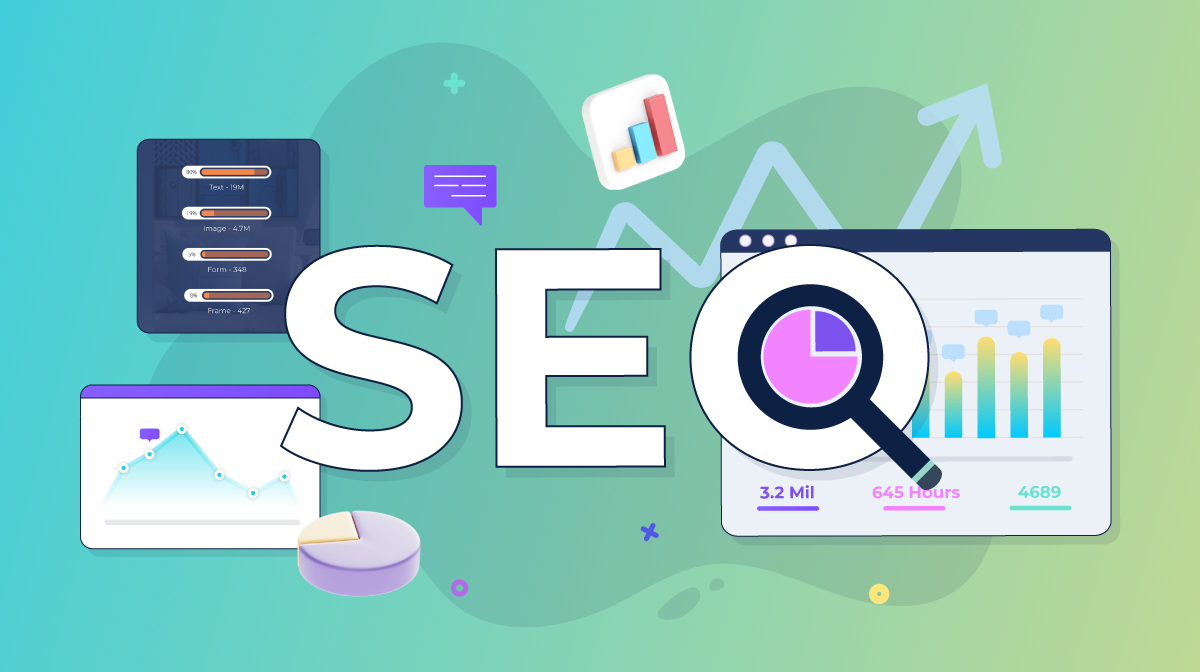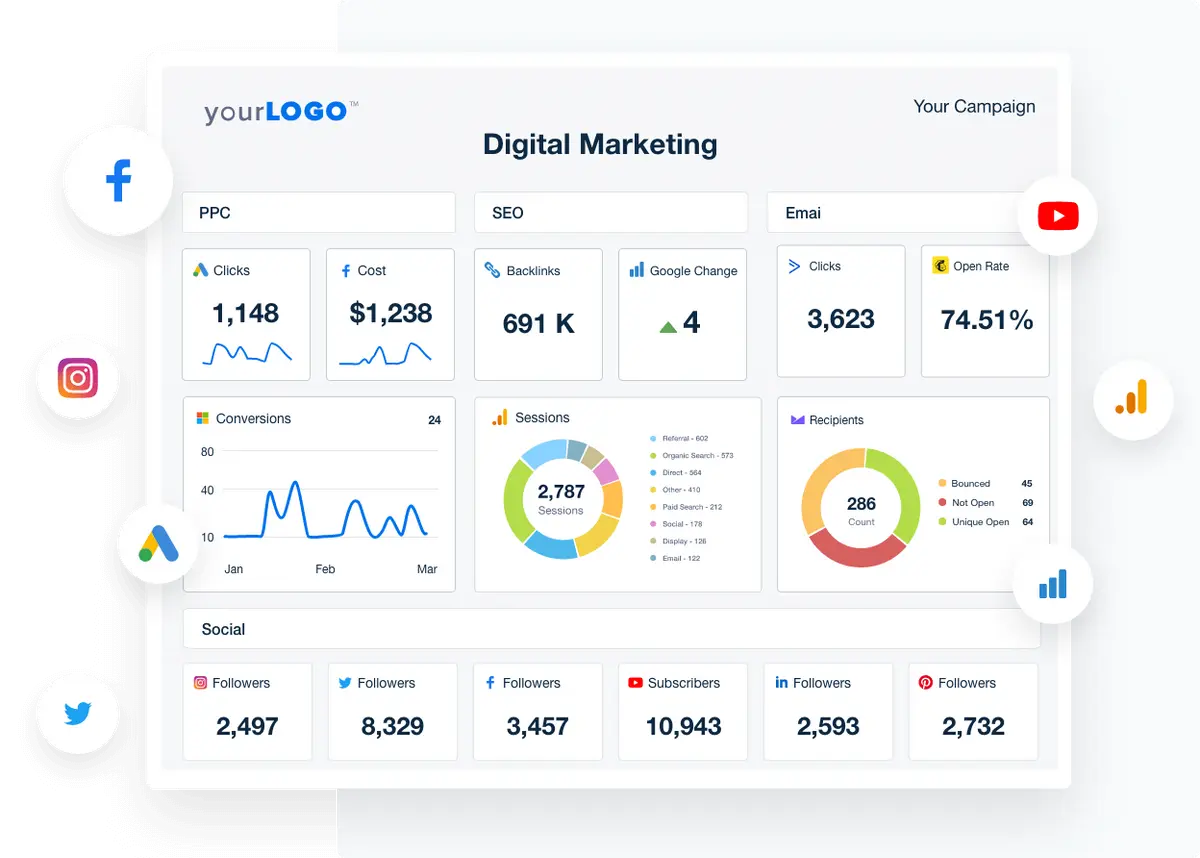
SEMrush, Ahrefs, Google Search Console, and Sistrix are often held high by marketers for their potent capabilities.
Besides their superior functionalities, such as tracking keyword rankings, monitoring backlink profiles, and analyzing competitors in the digital sphere, they offer an array of integrations like tracking SEO report metrics from social media platforms like YouTube and Instagram.
These platforms also exhibit robust, user-friendly interfaces that render complex data into understandable forms, creating a harmonious blend of automation and functionality. Now, let’s delve into what makes these software options stand out.
The best SEO reporting software often depends on the specific needs of the user. For many, SEMrush is a widely recognized and comprehensive tool for tracking SEO performance. Apart from providing standard features like keyword research, backlink analysis, and site auditing, SEMrush steps up with automation capabilities, allowing marketers to schedule and automatically generate SEO reports.
Crucial links from Instagram and YouTube feeds can be integrated into these reports, making it a valuable asset for optimizing website performance.
Best SEO Reporting Software
The world of SEO reporting software is vast, with numerous options boasting unique Instagram or YouTube integrations, amongst several other advanced features.
Each software has its own unique strengths, potential drawbacks, and links it can manage and display. Popular choices consistently stand out due to their comprehensive data analysis, detailed tracking results, and user-friendly interfaces.
-
SEMrush
SEMrush is a popular choice for its array of robust features that provide a complete view of a website’s performance, from SEO reports to social media effectiveness, it covers it all.
With its ability to track multiple projects at once, it’s no wonder it’s a favorite amongst marketers and automation enthusiasts.
-
Ahrefs
Ahrefs, another SEO powerhouse, excels at providing insights into competitor strategies, backlinks analysis, and keyword research. The ability to automate SEO reports and incorporate links from different social media platforms like YouTube and Instagram adds an extra layer of functionality and convenience.
-
Google Search Console
Google Search Console is a free tool that sheds light on a website’s performance on Google search results and factors in metrics from YouTube and other social media platforms.
-
Sistrix
Sistrix, with its core focus on providing detailed SEO reports integrated with social media metrics for a complete understanding of a website’s performance, is a favorite among bigger agencies and in-house SEO teams.
With these top SEO reporting software options, marketers can gain an edge in analyzing data, tracking results, making the most of social media integrations, and optimizing their websites for improved visibility and performance in search engines.
Crucial Features of Top SEO Reporting Software
So, you’re in the market for an SEO reporting tool. You want one that not only analyzes data but also tracks your results effectively, provides automation, and has integrations with platforms like YouTube and Instagram. Here are some key features to consider in your ideal tool.
When it comes to keywords, search engine rankings and position tracking, you need more than a tool that doesn’t just tell you which one’s people are in demand. An account with a resource like Moz can provide you with invaluable SEO metrics.
Try finding software that can identify valuable keywords, track their SERP positions over time, and even help you discover new opportunities for keywords you may not have considered. This feature meticulously completes site audits to help you stay competitive in the ever-evolving world of search engine optimization.
Comprehensive Keyword Analysis
In short: Your keyword analysis capability will make or break your SEO efforts when it comes to SERP positions.
Backlinks are like votes from other websites that tell search engines your content is dependable. Hence, it’s important to have a Moz account that offers detailed insights into your backlink profiles.
This includes being able to analyze your link-building strategies and understand where your backlinks are coming from. Effective backlink monitoring helps ensure that your site is seen as authoritative by search engines.

Backlink Monitoring
In essence: High-quality backlinks are golden treasures in the world of SEO, and monitoring their positions using SEO metrics like those offered by Moz is essential.
A top-notch SEO reporting tool like Moz should be capable of performing comprehensive website audits, identifying technical issues that could be hindering your search engine rankings.
This means diving deep into every nook and cranny of your website to discover any potential problems and recommend improvements. After all, it’s hard to reach the top of the search results if your website has fundamental issues detected in site audits.
Site Audit Capabilities
The bottom line: If your site isn’t technically sound indicated by site audits, all other SEO efforts related to positions could be in vain.
Understanding what your competitors are doing can provide invaluable insights into their strategies and performance with position tracking.
Look for software that includes competitor analysis features, allowing you to see what’s working (and what’s not) for others in your space. By learning from your competition, you can adapt and improve your own SEO tactics.
Competitor Analysis
Simply put: Keeping an eye on the competition using SEO metrics from your Moz account can provide you a strategic advantage in the SEO game.
Having covered these crucial features, it’s evident that selecting the right SEO reporting software isn’t just about tracking numbers—it’s about gaining deep insights using powerful tools that provide a competitive edge in the ever-evolving world of search engine optimization.
When it comes to your website’s performance in search engine rankings, an effective SEO strategy is pivotal. By leveraging SEO reporting software like Moz, you open the door to a host of benefits that can greatly enhance your digital presence.
Advantages and Impact of Utilizing SEO Reporting Software
First and foremost, enhanced website visibility is a critical result of utilizing SEO reporting software. By identifying valuable keyword opportunities and optimizing content to rank for those keywords, websites stand to gain increased visibility in search engine results pages.
This increased exposure can lead to higher organic traffic and ultimately greater brand awareness.
Furthermore, access to comprehensive data from SEO metrics empowers website owners to make informed decisions about their SEO strategies.
Instead of relying on guesswork or anecdotal evidence, having concrete data at your fingertips from site audits allows for strategic adjustments that are based on real insights. This ultimately leads to more efficient and effective SEO efforts.
Consider a scenario where an e-commerce site discovers through SEO reporting software that a specific product category is driving significantly less organic traffic compared to others.
Armed with this information, the website owner can tailor their content and optimization efforts to target relevant keywords and improve visibility for that category, thereby driving more traffic and potential conversions.
Moreover, harnessing the power of SEO reporting software, like HubSpot, offers substantial authority in the digital landscape.
Understanding competitor performance and strategies through detailed analysis of their keyword rankings, backlink profiles, and content strategies, using your SEO skills can offer invaluable insights into areas of opportunity and potential threats.
This competitive intelligence becomes a strategic advantage when formulating and fine-tuning your own SEO campaigns.
It’s akin to having a peek behind the curtain—gaining awareness of what’s working for competitors allows you to refine your own approach while also identifying unique opportunities such as affiliate programs that may have been overlooked previously.
By leveraging these invaluable benefits offered by SEO reporting software and platforms like Google Ads, website owners can navigate the complex realm of digital marketing with clarity and confidence, knowing that their decisions are backed by robust data-driven insights.
The advantages mentioned above underscore the pivotal role of SEO reporting software in not only optimizing website performance but also in informing intelligent decision-making for sustainable digital growth.
In the world of SEO reporting, having a full arsenal of complementary tools can make all the difference. Let’s start by examining three vital tools – HubSpot, Google Analytics, Google Tag Manager, and Chrome Developer Tools.
Also worthy of mention is the utilization of visual platforms like Pinterest for link building and driving traffic.
Complementary Tools for Optimal SEO Reporting
Google Analytics is like having a secret window into your website. By performing an SEO audit, you can track how many visitors you’re getting, where they are coming from, and what they do once they reach your site.
This knowledge will help you figure out the impact of your SEO campaigns and where you need to make improvements.
All these details provide insights into the performance of specific keywords and the ROI of content marketing efforts. The data from Google Analytics serves as an invaluable resource for refining your SEO strategy.
Google Analytics
Now, let’s introduce Google Tag Manager – an efficient way to manage the numerous tags or snippets of code that you place on your website to track information and send it to other systems like Google Analytics or advertising platforms like Google Ads.
By centralizing all your tracking codes in one place, you simplify the process of adding and updating tags on your website. This not only streamlines tag management but also improves website load times, supporting the overall health of your SEO campaigns.
Google Tag Manager
As for Chrome Developer Tools, this set of web developer tools built directly into the Google Chrome browser allows developers to inspect, debug, and perform an SEO audit on their websites.
These audits provide suggestions for optimization and help in identifying issues that could be impacting SEO performance. By leveraging Chrome Developer Tools, users can diagnose and rectify website issues that might be hindering their SEO campaigns.
Chrome Developer Tools
Incorporating these complementary tools alongside SEO reporting software, affiliate programs, and platforms like Pinterest enriches your ability to understand key aspects of website traffic, user behavior, and technical performance.
Together, they provide a comprehensive suite for achieving optimal SEO reporting capabilities and ensure a well-rounded, data-backed approach to analyzing and tracking results.
When it comes to analyzing and tracking SEO data, performance metrics play a major role and it’s clear that one size does not fit all.
Each business has unique goals and needs, and as a result, the competent team members, armed with the appropriate SEO tool, should conduct detailed SEO research to tailor reporting tools and metrics to align with these specific objectives.
Customizing Your SEO Reporting Experience for Business Needs
Customization is the key to making your SEO reporting insightful and relevant. This involves setting up custom dashboards, reports, and alerts that are tailored to the specific Key Performance Indicators (KPIs) which are most relevant to your business’s objectives. This could include monitoring domain authority and landing pages performance.
Think about it this way: If you were a travel company, you’d want to focus on metrics related to website traffic, user engagement, and conversions. Here, the efficacy of landing pages might be a priority. On the other hand, an e-commerce store might prioritize metrics related to product visibility, sales, and customer retention.
Dashboards are the control centers for SEO reporting tools. They allow you to see all important data at a glance. Your dashboard should display the KPIs that matter most to your business, providing an instant overview of performance without having to wade through a sea of irrelevant data.
Creating Custom Dashboards
Consider including visual representations such as graphs or charts alongside raw data when customizing your dashboard. These visuals can help quickly highlight trends or outliers in the performance metrics that may require further SEO research by your team members.
Reporting isn’t just about pretty graphs and numbers; it’s about telling a story with data. Customized reports should provide clear insights into progress towards KPIs and highlight areas that may require attention or optimization.
By leveraging your SEO tool, you might find that certain landing pages need improvement or that domain authority can be enhanced.

Tailoring Reports for Relevance
By slicing and dicing the data to reflect the specific aspects of your website’s performance that matter most, you can better understand what’s working well and what could use improvement. This can be especially crucial when performing an SEO tool analysis of your site’s domain authority.
For instance, if you’re primarily concerned with organic search performance, then detailed reports on keyword ranking changes, organic traffic trends, and click-through rates would be crucial.
Conversely, for businesses invested in paid advertising, reports on impression share, cost per click, and conversion rates would take center stage.
The goal in this task is to ensure that every piece of information presented in your report, from domain authority to the effectiveness of landing pages, directly contributes to actionable insights that can drive decisions.
In the fast-paced digital landscape, real-time alerting can spell the difference between seizing an opportunity and missing out.
By customizing alerts for significant changes in KPIs or sudden drops in website performance, businesses can stay ahead of issues before they snowball into bigger problems.
Timely Alerts
Setting thresholds for alerts based on what is considered normal or acceptable for your business ensures that you proactively address deviations from expected performance.
Customizing your SEO reporting experience allows you to zero in on what really matters for your business. By tailoring dashboards, reports, and alerts to reflect your specific objectives, you can make informed decisions that directly impact your online visibility and success.
When it comes to analyzing and tracking SEO data, there are several key players in the market. By leveraging the best SEO tool, carefully observing performance metrics, and ensuring a cooperative effort among team members, your business can genuinely benefit from this practice.
Comparing Popular SEO Reporting Software: SEMrush, Google Search Console and Others
When it comes to analyzing and tracking SEO data, there are several key players in the market. SEMrush is a powerhouse in this arena, offering a comprehensive suite of SEO tools that provide in-depth analytics and reporting encompassing keyword research, backlink analysis, and more.
On the other hand, Google Search Console stands out as a free tool provided by Google itself. It’s well-documented and covers the basics extensively, supplying unique data that no other tool can provide because it comes directly from Google’s own search index.
For instance, Google Search Console gives users insights into how their website is performing on Google search. This includes information about search queries that show users’ websites in search results, how often users click through from those results, and more. The fact that this data is from the source – Google – adds significant value and credibility to this tool.
Aside from these giants, there are other contenders like Ahrefs and Sistrix, each offering unique features and advantages that cater to specific user requirements. Ahrefs is highly regarded for its backlink analysis while Sistrix provides valuable insights for technical SEO auditing.
User Interface
A user-friendly interface is crucial for any SEO reporting tool. The ability to navigate and access data easily can make or break a user’s experience. SEMrush has garnered praise for its intuitive interface, making it easy for users to find what they need quickly.
On the other hand, Google Search Console boasts a simple yet effective interface due to its direct integration with Google’s search data.
Data Accuracy
The accuracy of the data provided by these tools is paramount. While SEMrush is known for its comprehensive database and regularly updated metrics, Google Search Console offers unparalleled accuracy as it taps directly into Google’s repository of website data.
Customer Support
Robust customer support can be a game-changer when using SEO reporting software. SEMrush is renowned for its responsive customer support team and extensive knowledge base, providing users with quick resolutions to their queries.
Google Search Console benefits from being backed by Google’s vast resources, offering reliable support.
Pricing
Pricing can be a significant factor in deciding which tool to choose. While SEMrush offers a range of plans catering to different business needs with its comprehensive suite of tools, Google Search Console stands out as a free tool accessible to all website owners.
As we’ve seen, comparing popular SEO reporting software requires considering various factors such as user interface, data accuracy, customer support, and pricing.
Each tool has its strengths and caters to different user requirements – the key lies in understanding your specific needs and aligning them with the offerings of each software option.
Making an informed decision about SEO reporting software involves weighing the pros and cons of each platform against your individual needs and expectations. This examination allows you to choose the best fit for optimizing your website’s performance.
